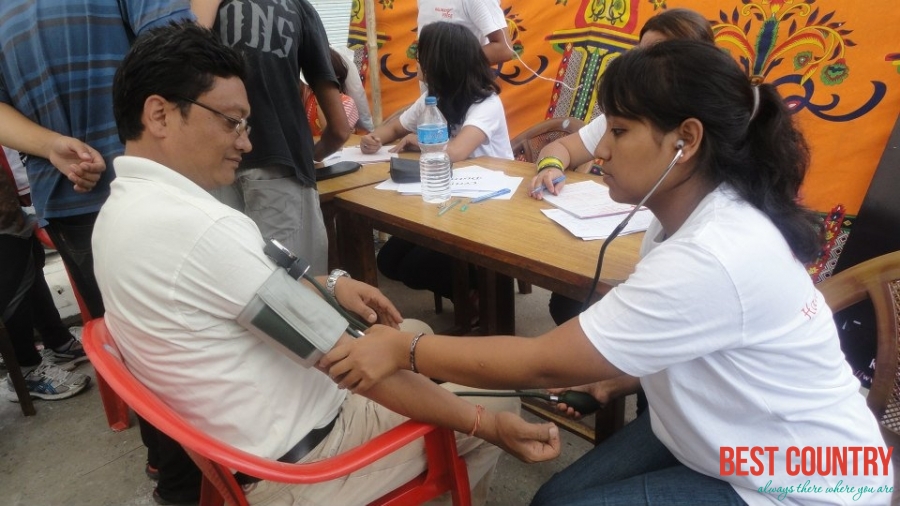Medicine in the different countries
Healthcare in Kazakhstan
299,5 billion tenge are provided for the Kazakhstan healthcare sector in the Republican budget in 2009, 411,6 billion tenge in 2010 and 368,9 billion tenge in 2011. Annually Government invests 25-30 billion tenge for purchase of medical equipment.
Health in Nepal
Health care services in Nepal are provided by both the public and private sector and fare poorly by international standards.
Health care system in Estonia
The Health Insurance Fund covers the costs of health services required by the person in case of illness regardless of the amount of social tax paid for the person concerned.
Healthcare in Scotland
Healthcare in Scotland is mainly provided by Scotland's public health service, NHS Scotland, that provides healthcare to all permanent residents that is free at the point of need and paid for from general taxation.
Healthcare in San Marino
San Marino has a high standard of compulsory, state-funded healthcare and medical staff are highly qualified. The country ranks in the top three healthcare providers in Europe.
Health Care in Romania
Medical care in Romania is generally not up to Western standards, and basic medical supplies are limited, especially outside major cities.
Health Care in Maldives
In Maldives the Ministry of Health is responsible for the delivery of health services.
Health Care in Portugal
Since 2002 the Portuguese health care system has been undergoing a major and long awaited reform. Just like the National Health Service in the United Kingdom, Portugal’s free health service was suffering from under investment, over subscription and was buckling under the weight of ineffectiveness.
The Polish health care system
Poland’s health care is based on a general health insurance system. Subsidized health services are provided to Polish residents that are covered by the general health insurance. This can be either on a compulsory or a voluntary basis.
Health in Comoros
Comoros health sector has been looked after by the hospitals that are located on the islands of Comoros. But these hospitals of Comoros are not that well developed and are dependent on traditional healers. People having financial stability, go to France or Madagascar for medical treatment.
Fiji Health Care and Vaccinations
Healthcare facilities in Fiji urban areas are adequate for routine medical problems. In the rural areas staff training is limited and there are often shortages of supplies and medications. Emergency response is extremely limited, and the few ambulances available are poorly equipped and staffed.
Tuvalu Health Care and Vaccinations
Travellers are recommended to take out full medical insurance before departure. Tuvalu's only hospital is in Funafuti; the outer islands only have trained nurses. More serious and complicated problems may require medicinal evacuation to Fiji or Australia.
Medicine of the Solomon Islands
In traditional Solomon Island society, every disease has a spiritual cause or explanation to it. Before Western-introduced diseases, there were traditional cures for most diseases. With the introduction of Western diseases and medicine, the whole equation changed drastically.
Health Care In Luxembourg
The highly developed compulsory state-funded health care system of the Grand Duchy of Luxembourg is widely available and free to all citizens, offering unlimited access to residents and boasting modern and high quality medical facilities.













